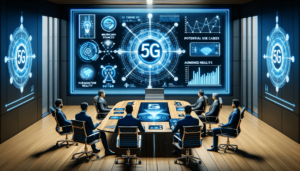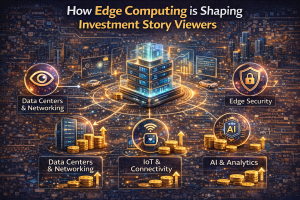Table of Contents
In today’s fast-paced digital landscape, 5G for business stands as a groundbreaking advancement, set to redefine how enterprises operate, innovate, and grow. As the fifth generation of mobile network technology, 5G offers unparalleled speeds, minimal latency, and robust connectivity. But for the business world, 5G is more than just a technological upgrade; it’s a catalyst for transformation that will reshape operational efficiency, enhance customer engagement, and provide a significant competitive advantage.
This guide aims to explore the multifaceted impact of 5G for business, from its technical specifications to its real-world applications across various industries. Whether you’re a small business owner keen on streamlining operations or a corporate leader looking to expand on a global scale, understanding the far-reaching implications of 5G technology is crucial for future success.
So, let’s delve deeper into what 5G for business means and how it can serve as a cornerstone for the next wave of digital transformation.
The Technical Advancements of 5G: Speed, Latency, and Connectivity
As we delve deeper into the world of 5G, it’s essential to understand the technical advancements that set it apart from previous generations of mobile networks. The three pillars that define 5G’s superiority are its unparalleled speed, reduced latency, and enhanced connectivity. These attributes not only improve the user experience but also open up a plethora of opportunities for businesses to innovate and grow.
Speed
One of the most talked-about features of 5G is its speed, which is expected to be up to 100 times faster than 4G networks. This dramatic increase in data transfer rates will enable businesses to download and upload large files in seconds, stream high-quality video without buffering, and conduct real-time analytics with ease.
Latency
Latency, or the time it takes for data to travel between devices, is another critical factor where 5G excels. With latency as low as one millisecond, 5G offers near-instantaneous data transfer. This is particularly beneficial for applications that require real-time responses, such as autonomous vehicles, remote surgeries, and industrial automation.
Connectivity
The ability to connect more devices simultaneously is one of 5G’s standout features. Unlike its predecessors, 5G can support up to a million devices per square kilometer. This enhanced connectivity is crucial for the proliferation of
Transforming Industries and Creating Opportunities
The advent of 5G for business is not just an incremental improvement over 4G; it’s a transformative force that is set to reshape industries and create unprecedented opportunities for innovation and growth. From manufacturing and healthcare to retail and transportation, the applications of 5G in business are vast and varied. Here’s how:

Manufacturing: Smart Factories and Automation
The implementation of 5G in manufacturing can lead to the creation of smart factories where machines are interconnected, and data is shared in real-time. This enables more efficient use of resources and quicker decision-making, ultimately increasing productivity and reducing costs.
Healthcare: Telemedicine and Remote Surgeries
5G’s low latency and high-speed capabilities make it ideal for telemedicine and even remote surgeries. This can revolutionize healthcare by making medical expertise accessible in remote areas and providing real-time monitoring of patients.
Retail: Enhanced Customer Experience
In the retail sector, 5G technology for business can significantly enhance the customer experience. From virtual fitting rooms to personalized advertising based on real-time analytics, 5G can make shopping more interactive and personalized.
Transportation: Autonomous Vehicles and Smart Infrastructure
The transportation industry stands to gain immensely from 5G business applications. The low latency and high-speed data transfer can facilitate the operation of autonomous vehicles and smart infrastructure, making transportation more efficient and safer.
Agriculture: Precision Farming
5G for business can also extend to agriculture, where its high-speed and low-latency capabilities can enable precision farming. This involves the use of sensors and drones to monitor and analyze soil, weather, and crop conditions to make more informed decisions.
By transforming these industries, 5G for business opens up new avenues for revenue generation, operational efficiency, and competitive advantage. As 5G networks continue to roll out, businesses that adapt and integrate this technology will be better positioned for long-term success.
5G for Business: Security and Compliance Considerations
As businesses prepare to integrate 5G for business into their operations, it’s crucial to consider the security and compliance aspects that come with this new technology. While 5G offers transformative benefits, it also introduces new challenges and vulnerabilities that organizations must address to ensure the integrity and safety of their data and systems.
Network Security
The deployment of 5G in business settings will necessitate robust network security protocols. Given the increased number of connected devices and the sensitive nature of the data being transmitted, businesses will need to implement advanced encryption methods and multi-factor authentication to protect against unauthorized access and data breaches.
5G for Business: Data Privacy
With 5G’s high-speed data transfer capabilities, ensuring data privacy becomes more critical than ever. Businesses will need to comply with data protection regulations such as GDPR in Europe or CCPA in the United States, especially when handling customer data.
Compliance and Standards
Adopting 5G for business will require adherence to various industry standards and regulations, particularly for sectors like healthcare and finance, which deal with highly sensitive information. Organizations will need to stay updated on the latest compliance requirements to avoid legal repercussions.
5G for Business: Vendor and Partner Ecosystem
As businesses adopt 5G technology, they will likely engage with a range of vendors and partners for hardware, software, and services. Ensuring that these third parties meet security and compliance standards is essential to maintain the overall integrity of a 5G-enabled business ecosystem.
By proactively addressing these security and compliance considerations, businesses can safely and effectively leverage 5G for business to gain a competitive edge and drive innovation.
5G for Business: Preparing for the Transition
As the rollout of 5G for business continues to gain momentum, preparation is key for organizations looking to capitalize on this transformative technology. From infrastructure upgrades to employee training, there are several steps businesses must take to ensure a smooth and successful transition to a 5G-enabled environment.

Infrastructure Upgrades
One of the first steps in preparing for 5G in business is upgrading the existing infrastructure. This may involve installing new antennas, routers, and other hardware that are compatible with 5G technology. Additionally, software updates may be required to handle the increased data speeds and connectivity options.
Employee Training
Understanding the capabilities and limitations of 5G technology is crucial for maximizing its potential benefits. Employee training programs should be implemented to educate staff on how to effectively use 5G in their specific roles, whether it’s for data analysis, customer service, or field operations.
Cost-Benefit Analysis
Before fully committing to 5G for business, organizations should conduct a thorough cost-benefit analysis. This involves evaluating the initial investment costs for hardware and software, as well as the long-term operational costs, against the expected benefits such as increased efficiency, revenue growth, and competitive advantage.
Pilot Programs
Before a full-scale rollout, it’s advisable to run pilot programs to test the effectiveness of 5G in a business setting. These trials can provide valuable insights into any challenges or limitations that may arise, allowing for adjustments to be made before broader implementation.
5G for Business: Consulting Experts
Given the technical complexities and potential challenges of adopting 5G for business, consulting with experts in the field can provide valuable insights. Whether it’s network engineers, cybersecurity professionals, or industry consultants, their expertise can help guide a successful transition to a 5G-enabled business landscape.
By taking these preparatory steps, businesses can position themselves to fully leverage the transformative potential of 5G for business, ensuring not only a smooth transition but also long-term success in an increasingly competitive market.
5G for Business: Future Outlook and Emerging Trends
As we look toward the future, it’s evident that 5G for business is not a fleeting trend but a foundational shift that will continue to influence the business landscape in significant ways. From enabling new business models to catalyzing digital transformation, the impact of 5G technology will be felt across various sectors. Here are some emerging trends and future outlooks to consider:

Emerging Trends in 5G for Business
- Edge Computing: With 5G’s low latency, edge computing will become increasingly feasible, allowing for real-time data processing closer to the source of data generation. This is particularly useful for IoT applications and real-time analytics.
- Virtual and Augmented Reality: The high data speeds and low latency of 5G will make Virtual Reality (VR) and Augmented Reality (AR) more effective for training, simulations, and customer experiences.
- AI and Machine Learning: The capabilities of 5G will accelerate the adoption of AI and machine learning algorithms for data analysis, predictive maintenance, and customer service.
- Smart Cities: The enhanced connectivity offered by 5G will facilitate the development of smart cities, where everything from traffic lights to utility grids can be optimized for efficiency and sustainability.
- Global Expansion: As 5G networks become more widespread, businesses will have more opportunities to expand globally, particularly in emerging markets where 5G is being rapidly adopted.
For a deeper dive into the future outlook and emerging trends of 5G for business, you can refer to this comprehensive report by J.P. Morgan.
By staying ahead of these trends and continuously adapting, businesses can leverage 5G for business to its fullest potential, ensuring long-term success and competitiveness in a rapidly evolving digital landscape.
Conclusion: Seizing the 5G Opportunity in Business
As we’ve explored in this comprehensive guide, 5G for business is a transformative force that offers a multitude of opportunities for innovation, efficiency, and growth. From its technical prowess in terms of speed, latency, and connectivity to its wide-ranging applications across industries like manufacturing, healthcare, and retail, the potential of 5G is immense.
However, the transition to a 5G-enabled business landscape is not without its challenges. Security and compliance considerations, infrastructure upgrades, and employee training are all critical components that businesses must address to successfully integrate 5G into their operations.
The future is promising, and the emerging trends indicate that 5G technology will continue to evolve and offer even more capabilities that can benefit businesses. Those who proactively embrace this technology, understand its implications, and adapt their business models accordingly will be the ones to gain a significant competitive advantage in the market.








